Letters from Lodi
An insightful and objective look at viticulture and winemaking from the Lodi
Appellation and the growers and vintners behind these crafts. Told from the
perspective of multi-award winning wine journalist, Randy Caparoso.
Wines reflecting Vino Farms' push towards organic, biodynamic farming and grapes conducive to Lodi's natural environment
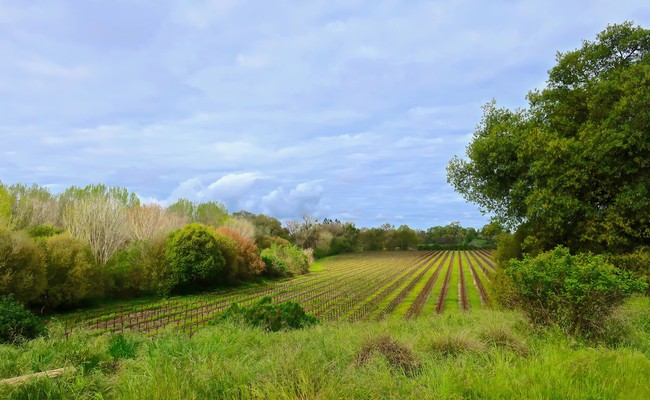
Vino Farms' The Bench Vineyard; biodynamically farmed Vermentino alongside the Mokelumne River in Lodi's Clements Hills AVA.
Since 2018, Vino Farms has been farming a good chunk of its 4,500 or so acres in the Lodi appellation in multiple fashions falling under the broader umbrella that can be described as sustainable.
This past week, when presenting his family's showcase sustainable vineyard⏤a Clements Hills-Lodi AVA property called Grand Vin Lands⏤Vino Farms VP/Partner Craig Ledbetter told a group of visiting journalists from Wine Enthusiast Magazine:
"Vino Farms sells most of its grapes to the large wineries. We recognize, though, that the entire industry is moving towards the type of premium quality favored by smaller, handcraft producers.
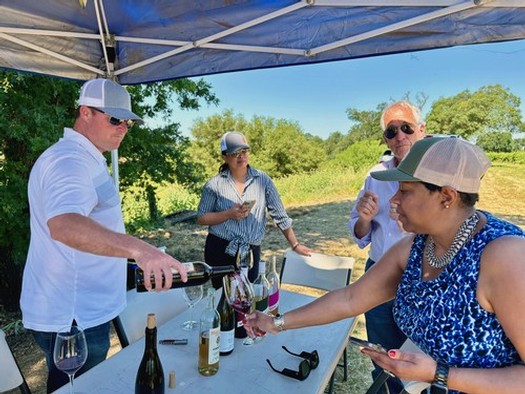
Vino Farms' Craig Ledbetter pouring Sangiovese for Wine Enthusiast wine reviewer Tonya Pitts, with the magazine's Anna-Christina Cabrales and Avivo Wines' Ridgely Evers looking on.
"Therefore we have been dedicating a larger proportion of our efforts to higher-quality production. The entire Lodi winegrowing region will eventually need to move in that direction in order to thrive. We're doing it by looking at alternative routes to continue farming. Simply put, in order to get paid more for fruit, we have to farm for higher quality.
"That is why, for instance, all 600 acres owned by our family in Lodi are, or are currently being transitioned to, certified organic or biodynamic farming."
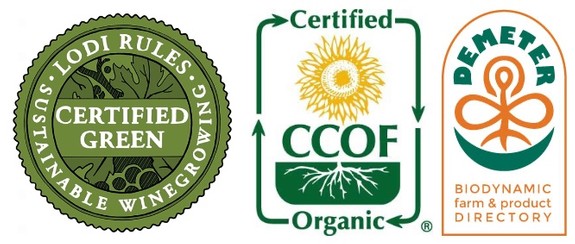
Certification seals simultaneously earned by some of Vino Farms' Lodi vineyards (from left): LODI RULES for Sustainable Winegrowing, California Certified Organic Farmers and Demeter USA (the latter, for biodynamic farming).
As it were, all the vineyards farmed by Vino Farms throughout the state of California⏤in total a whopping 17,000-plus acres spread across 10 counties⏤have long been third-party certified by the industry-leading LODI RULES for Sustainable Winegrowing.
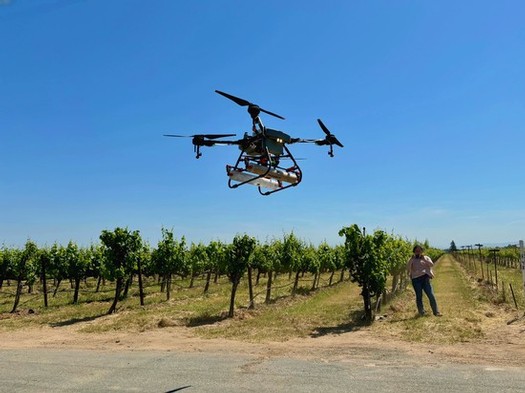
HIgh tech sustainable practice: Last week, drone utilized in Vino Farms' Grand Vin Lands to efficiently drop green lacewing larvae to help combat vine mealy bug, a severe economic pest throughout California's winegrowing regions.
Says Ledbetter, "We are going beyond LODI RULES by getting many of our vineyards certified by CCOF [i.e., California Certified Organic Farmers], a priority for many small producers. Two of our properties⏤The Bench Vineyard here in Clements Hills and River's Edge Vineyard on our home property in the Mokelumne River AVA⏤are also certified by Demeter [monitoring Biodynamic® farming in the U.S.], which some of the wineries like even more."
Underlining the Ledbetter family's long-term, future generational commitment to the environment, Mr. Ledbetter adds, "Many of our vineyards are certified by Xerces Society [i.e., Bee Better Certified® for pollinator conservation], and for the past 20 years we have put a lot of energy into the restoration of native habitats for plants and animals on our riparian properties."
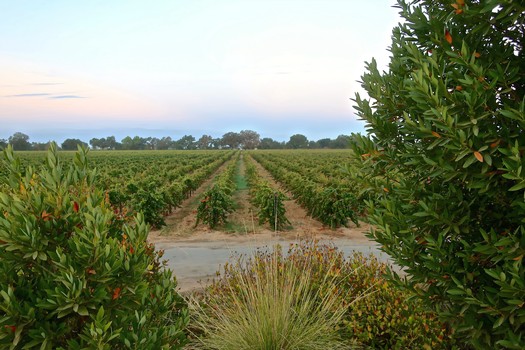
Vino Farms' Grand Vin Lands seen through a hedgerow of native plants friendly to beneficial insects.
Besides regenerative farming, Ledbetter cites alternative grape varieties as the other key component. "Alternative grapes are part of alternative farming," says Ledbetter. "We have been focusing more on grapes that are a better fit for our Mediterranean climate. It makes sense to concentrate on, say, Italian, Spanish or Southern French grapes that are more easily adapted to the region because they can be farmed without the use of pesticides."
Typical of multi-generational Lodi farming families, overnight success has never been the Ledbetters' expectation. Yet, according to Mr. Ledbetter, "We are now up to 35 small producers who are attracted specifically to our regenerative program. It is true that we probably spend maybe half our time and energy tending to vineyards amounting to less than 2% of our income, but I'd say it is 100% more satisfying!"
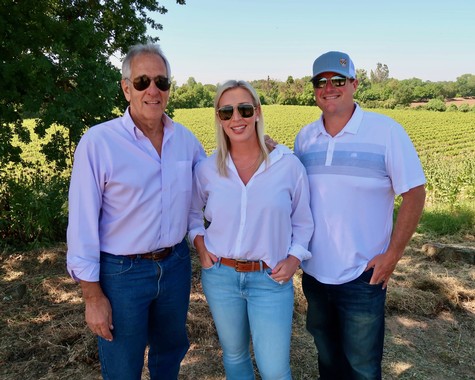
On a bluff overlooking Vino Farms' The Bench Vineyard last week: Avivo Wines owner Ridgely Evers with Vino Farms' Courtney Lyons and Craig Ledbetter.
Avivo's national roll-out of responsibly farmed alternative varietals
Ridgely ("Ridge") Evers of the Sonoma-based Avivo Wines joined Mr. Ledbetter at The Bench Vineyard to present his biodynamic-grown wines to the Wine Enthusiast editors.
Explained Mr. Evers, "I started making wine from Lodi fruit in 2012, recognizing that Mediterranean climate varieties such as Vermentino understand latitude better than longitude. Having vineyards in Sonoma County, I can tell you that there is not a lot of difference in quality between the fruit grown in Lodi and Napa or Sonoma.

Vino Farms vineyard manager Marisela Granados with Vermentino harvested in The Bench Vineyard.
"The key is right grapes for the right place," added Evers. "The foundation of the Avivo brand was the biodynamic Vermentino and Sangiovese grown by Vino Farms. The entire thrust of Avivo is producing delicious wine that can sell for $20 in every store across the country⏤wines that are better for the planet, and better for consumers.
"Yes, it's all about responsible farming and environmental health; including water, a resource in increasing danger of being lost. But it's also about the people who take care of these vineyards. Once I l learned what the Ledbetters do for their workers⏤offering them far higher pay than the industry standard plus health benefits [according to Ledbetter, the Vino Farms health plan entails a $1/month premium plus 401(k) for every one of their roughly 300 full-time employees]⏤I knew Vino Farms was the perfect fit for Avivo."
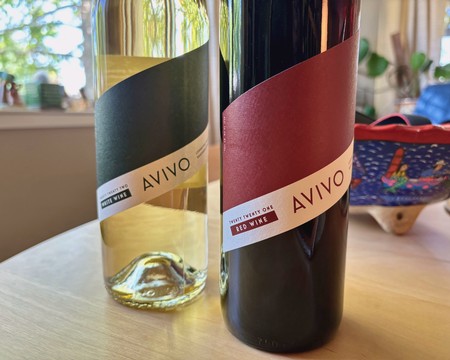
Current vintages of biodynamic certified wines grown by Vino Farms
2022 Avivo Wines, Ledbetter Family Lodi White Wine (100% Vermentino; $24)
The front label of this Clements Hills-Lodi white wine boldly notates that it is "regeneratively farmed." The back label adds, "We look to the grapes' native microbiology for fermentation [meaning, the wine is entirely native yeast fermented], and rest the wine in neutral oak barrels."
As Evers explained to our group of visiting journalists, "When you farm conventionally, the first casualty in a vineyard is its microbiology⏤particularly, the diverse population of yeasts living in the soil and on the plants... When you farm regeneratively, the microbiology of a vineyard comes roaring back and has a direct impact on the quality of the wine."
If anything, the persistent quality of this dry white is its fragrant, floral, stony and crunchy pear-like fruit profile more than apparent in the nose as well as in its long and light-medium bodied presence on the palate (the label reads 12.3% ABV). Terrific quality for a wine that sells for less than $20 in many markets.
2023 Monte Rio Cellars, "The Bench" Clements Hills Vermentino ($24)
Out on a bluff overlooking The Bench Vineyard, nestled along Lodi's Mokelumne River, where his Vermentino is farmed, Ledbetter also poured this variant of the varietal, a completely different take on Vermentino To begin with, Monte Rio's is 100% native yeast skin-fermented (whereas the Avivo Vermentino is fermented from whole cluster pressed juice, in the fashion of well over 99% of California white wines), which gives the wine a transparent orange tint as well as a more intense, spiced fragrance, suggesting clove-punctured orange rinds and more citrusy fruit.
The varietal's intrinsic minerality is felt on the palate, which is crisp and silk textured, carried by an easy-going light-medium body (barely 12.0% ABV). Very clean, very refreshing, nicely done.
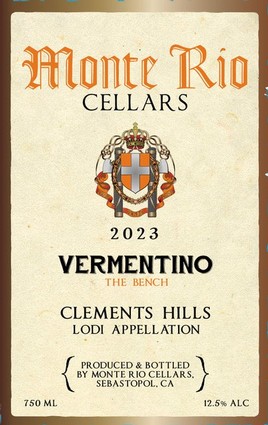
2023 Pax Winery, The Bench Vineyard Clements Hills-Lodi Vermentino ($34)
Like the Avivo Vermentino, Pax's iteration of The Bench Vineyard Vermentino is whole cluster pressed and native yeast fermented. Unlike Avivo's, this light, crisp dry white wine sports a more strongly minerally, downright earthy aromatic profile, with a briny as well as lemony crisp edginess predominant on the palate (12.0% ABV)—adding up to more of the wild or "funky" character associated with many of today's wines described as "natural," definitely appealing to consumers with a yen for unconventional tastes.
2023 Avivo Wines, Ledbetter Family Lodi Rosé (Sangiovese; $24)
Although this pale orange tinted dry wine is vinified primarily from a saignée (i.e., juice pressed from fermenting red wine) of Sangiovese grapes biodynamically farmed in the Ledbetter family's River's Edge Vineyard, it retains all the delicacy (just 12.8% ABV) and delineation of fruit typifying rosés fermented entirely from grapes pressed just to produce a dry rosé. The nose is fragrant and flower petal-like, suggesting red berry tea; the palate feel, fine, crisp, silky, fresh and buoyantly accented by a mild tartness.
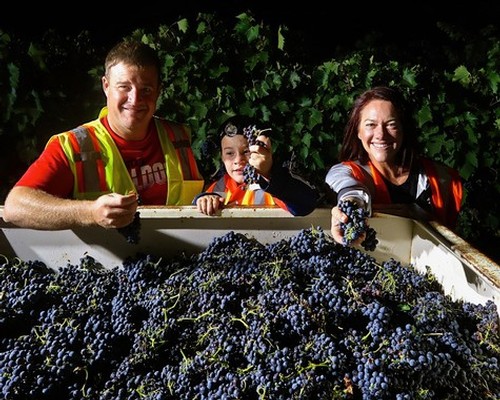
The Ledbetter family (Craig, Chas and Suzanne) hand-harvesting 2020 Sangiovese at night in River's Edge Vineyard.
2021 Avivo Wines, Ledbetter Family Lodi Red Wine (Sangiovese; $24)
This east side Mokelumne River-Lodi block of Sangiovese⏤originally planted by the Ledbetters in 1995 for Robert Mondavi Winery's long discontinued La Famiglia label⏤now produces tiny clusters of this Tuscan grape, yielding flowery reds with compellingly rosebud-like spice nuances. The palate feel of this native yeast fermented red is zesty yet finely textured, with a silkiness belying the label's stated 14.2% ABV.
2023 Monte Rio Cellars, "River's Edge" Clements Hills-Lodi Sangiovese ($25)
There is a slightly wilder, more herbaceous, vaguely animal-like (like the scent of rosemary rubbed between the fingers) edginess to the red berry/cherry fragrance of this native yeast, neutral barrel-aged rendering of River's Edge Vineyard Sangiovese. On the palate, the herbiness becomes spicier, the red berry profile lifted by markedly lively acidity and pervasive sense of lightness (just 12.5% ABV)⏤sensory qualities that, according to the winery website, positively scream "spaghetti and meatballs!"
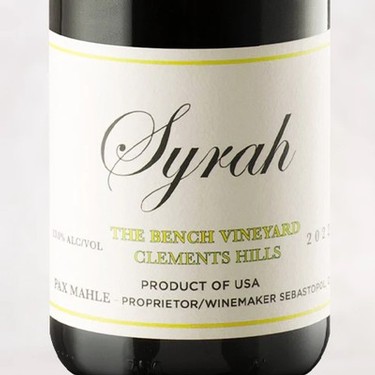
2022 Pax Winery, The Bench Vineyard Clements Hills-Lodi Syrah ($46)
Unlike the Sangiovese-based Monte Rio and Avivo reds sourced from Vino Farms, this pure Syrah reaches for ultra-premium handcrafted skies, with a price point reflecting that aspiration. It succeeds in every way: Starting with a vivid purplish ruby color and an explosively multifaceted nose of spices (cracked sweet peppercorn and fenneled sausage), olives, and violet-like floral perfumes. Here, the contemporary style, native yeast, low intervention approach to winemaking accentuates the natural qualities of the varietal, and true sense of this sun-soaked appellation, all the more.
On the palate, the wine is rich, velvety, mouth-filling, yet surprisingly lithe and nimble (a restrained 13.0% ABV); the layering of flavors unimpeded by wood (6 months in 500-liter French oak puncheons). The winery recommends braised short ribs or lamb tagine (it's exotic enough for the latter!), describing it, simply, as "classic Syrah." Indubitably
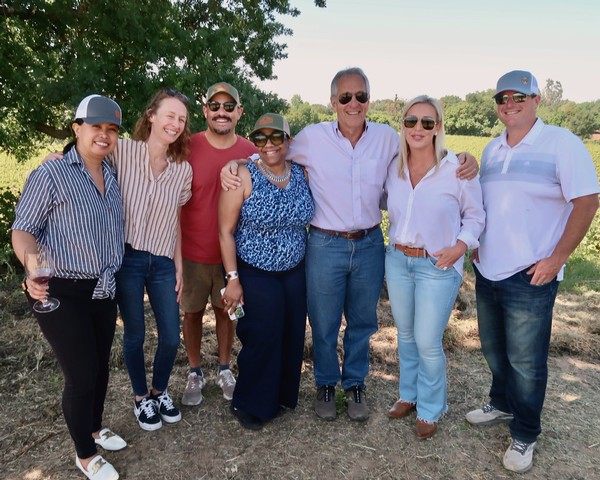
This past May 15 at Vino Farms' The Bench Vineyard: Wine Enthusiast editors (from left, Anna-Christina Cabrales, Sara Ventiera, Anthony Eyzaguirre and Tonya Pitts with Avivo's Ridge Evers and Vino Farms' Courtney Lyons and Craig Ledbetter.